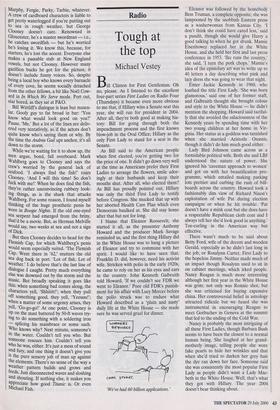Cinema
The Perfect Storm (12, selected cinemas)
Heavy weather
Mark Steyn
When Sidney Lumet was directing Murder on the Orient Express, he hired the world's greatest authority' on train sounds. The sound editor worked for six weeks on train noises only. At the beginning of the story, when the train pulls out of Istanbul, every bell, every whoosh of steam, every grind of wheels was completely authentic, right down to the barely audible click as the engine's headlight goes on. And then they came to the mix, and Richard Rodney Bennett handed in his wonderful waltz theme for the scene, and Lumet knew that every single click and clank would be buried. `We've heard a train leave the sta- tion,' he told the, sound guy. `But we've never heard a train leave the station in three-quarter time.' The fellow walked out and Lumet never saw him again.
It was the right decision. The scene is about style and romance and nostalgia; though it has a train in it, it's not funda- mentally about trains. In The Perfect Storm, George Clooney's swordboat, the Andrea Gail, sails out of Gloucester, Mas- sachusetts, and, as Lumet did, Wolfgang Petersen says it with music. This time it's the wrong decision — and not just because the generic weepie-sweepie gloop by James (Titanic) Horner isn't a patch on Bennett. This is about boats: it's raw and elemental, not high-style and nostalgic. I'm no gnarled old lobsterman, but I've taken enough boats in New England, the Maritimes and the Gulf of St Lawrence — this film's gen- eral paddling pool — to be appreciative of what happens when you pull out: the sud- den noise, and then the moment when you look back and the dock and the town and the little clapboard houses slip silently away from you. It's one of the few experi- ences in life that is genuinely like a film shot. Maybe that's why Petersen blew it. But, whatever the reason, the generic mush to which the Andrea Gail departs is an early sign that, when eventually we get to the storm, Petersen won't be able to handle it.
Which isn't good news. In the half-hour or so we've spent in the Crow's Nest, a nautical haunt complete with leathery old sea dog, Petersen's pretty much sloughed off the human interest. This is the true story of a very famous storm of 1991, and so all the people in it are supposedly real. Yet, as seen here, they're just types: the guy whose girl doesn't want him to go back to sea, the guy who misses his kid, the guy who can't get laid, the guy who lays the other guy's ex, and, of course, the black guy. They're called Billy, Sully, Bugsy, `Let me tell you about today's specials.' Murphy, Fergie, Parky, Tarbie, whatever. A crew of cardboard characters is liable to get pretty waterlogged if you're putting out to sea in rough weather, but George Clooney doesn't care. Renowned in Gloucester, he's a master swordman — i.e., he catches swordfish — but he's worried he's losing it. We know this, because, for starters, he's lost the accent. Everyone else makes a passable stab at New England vowels, but not Clooney. However many gazillion bucks he got for the picture, it doesn't include funny voices. So, despite being a local boy who knows every barnacle of every cove, he seems socially detached from the other fellows, a bit like Noel Cow- ard in In Which We Serve mode. Port out, star bored, as they sat at P&O.
Bill Wittliffs dialogue is lean but muscu- lar. Goofy guy to fat broad in bar: 'You know what would look good on you?' Pause. 'Me.' But a lot of the lines are deliv- ered very tentatively, as if the actors don't quite know who's saying them or why. By the time the Andrea Gail ups anchor, it's all down to the storm.
While we're waiting for it to show up, the men argue, bond, fall overboard. Mark Wahlberg goes to Clooney and says the crew's worried by the general lack of seafood. 'I always find the fish!' roars Clooney. 'And I will this time! So don't fuck with me!' When he does find the fish, they're rather unconvincing rubbery look- ing things, as is the shark that attacks Wahlberg. For some reason, I found myself thinking of the huge prosthetic penis he wore in Boogie Nights. If the old one-eyed sea serpent had emerged from the briny, that'd be a movie. But, as Herman Melville would say, two weeks at sea and not a sign of Dick.
But then Clooney decides to head for the Flemish Cap, for which Wahlberg's penis would seem especially suited. 'The Flemish Cap. Went there in '62,' mutters the old sea dog back in port. 'Lot of fish. Lot of weather.' I do believe that's the last line of dialogue I caught. Pretty much everything else was drowned out by the storm and the music. But broadly speaking it goes like this: when something bad comes along, the characters yell, `Shhilitt!'; when they pull Off something good, they yell, `Yeessssr; when a matter of some urgency arises, they `Go-go-go!' At one point, Clooney is up on the mast battered by 50-ft waves try- ing to do something with a soldering iron splicing his mainbrace or some such. Who knows why? Next minute, someone's in the water. Couldn't tell you who. But someone rescues him. Couldn't tell you who he was, either. It's just a mess of sound and fury, and one thing it doesn't give you is the pure sensory jolt of man up against the elements. There's no sense of the way a weather pattern builds and grows and feeds. Just disconnected waves and sloshing and shouting. If nothing else, it makes you appreciate how good Titanic is. Or even Michael Fish.



























































 Previous page
Previous page